Last week the US Library of Congress issued a recommendation related to 3D printers. It’s short, promising or catastrophic depending on your point of view and utterly confusing.
3D print legal analyst Michael Weinberg posted his analysis of the recommendation. Here is his amusing summary:
The decision is, to put it mildly, a mess. It is as if, at the end of the long marathon that was the rulemaking process, the Librarian of Congress decided to slap on iceskates for the last 100 yards. The predictable result was that it fell, broke both legs, and vomited all over itself.
But what’s it all about? It relates to the US “DMCA Act”, legislation focused on preventing misuse of digital assets. It’s what the movie guys use to take down their products when they appear on YouTube.
Hold on, what does this have to do with 3D printers? It turns out there is a bit of digital method used on certain 3D printers. In some machines, most notably Stratasys and 3D Systems, the equipment is set up to accept only company-supplied materials. This is accomplished by including a chip on the material canister that is read and verified by the machine before it can start printing.
The proposal was that those who own such 3D printers be allowed an exemption from the DMCA to enable use of other materials. This would not only significantly reduce costs for users, it would also spark the use of alternative materials not currently offered by the manufacturers. As Weinberg explains, several parties argued before the US Library of Congress in favor of such an exemption.
Meanwhile, there were arguments against the proposal, primarily from Stratasys, who stand to lose out on the lucrative material market supplying their machines. One of their arguments was that parts produced with non-certified materials could be defective or dangerous, and this won’t do if the part is to be used in critical activities, such as aerospace or medical applications.
In the end, the Library of Congress proceed with this recommendation:
Computer programs that operate 3D printers that employ microchip -reliant technological measures to limit the use of feedstock, when circumvention is accomplished solely for the purpose of using alternative feedstock and not for the purpose of accessing design software, design files or proprietary data; provided, however, that the exemption shall not extend to any computer program on a 3D printer that produces goods or materials for use in commerce the physical production of which is subject to legal or regulatory oversight or a related certification process, or where the circumvention is otherwise unlawful.
So, in other words, they’re recommending 3D printer owners CAN use alternative materials, so long as they’re not producing critical stuff.
Or at least that seems to be their intention.
However, there’s a number of problems with this recommendation, as Weinberg points out in his analysis:
What is a 3D printer that produces regulated goods or materials? Wouldn’t that be ANY 3D printer? This is talking about USAGE, not the MACHINE!
The Library of Congress deals with Copyright, and the use of chips to control materials in a 3D printer doesn’t seem to have anything to do with Copyright.
Finally, the Library of Congress cannot change the DMCA; they are merely providing a recommendation. So nothing really changes here.
Thus, this recommendation is definitely confusing, exciting if you’re a user, disappointing if you’re Stratasys (or 3D Systems) and possibly meaningless, too.
For the full details, please read Weinberg’s analysis.
Via Michael Weinberg


